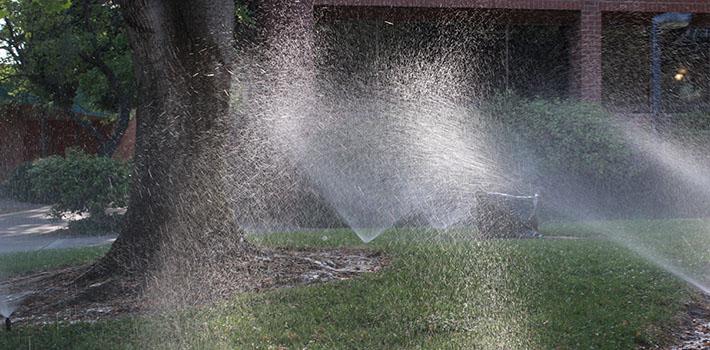Students returning to American River College for the fall semester may notice grass that has turned brown and sidewalks that are dusty.
All that is part of the Los Rios Community College District’s efforts to save water following Governor Jerry Brown’s April 1 executive order that curbs water use in response to the drought.
“We have what we’re going to be calling ‘kill zones,’ where we’re going to have no watering at all,” said groundskeeper Brenda Baker. “If there’s no tree in a square of turf, then it’s a kill zone.”
Without water, the grass in the “kill zones” will go brown. Planned locations include the lawn in front of the theater and the lawn that stretches from the library to the science classrooms.
“We can’t have it look like that before graduation,” said Baker. “We have to keep it looking nice because so many people come onto campus who don’t normally see campus.”
Baker and head groundskeeper Michael Kuuskvere agreed that the potential for fire is the biggest risk.
“You obviously don’t want to drop a cigarette in there,” said Kuuskvere.
According to Baker, people walking over the less watered areas of the lawn instead of strictly on the sidewalks will bring dirt and dust to the sidewalks and walkways of the campus.
“What’s normally green and watered will be muddy,” said Baker. “Students don’t adhere to traffic patterns. They don’t stay on the sidewalk. They’re gonna get dirty, dusty feet. It’s going to get carried into the classrooms.”
Brown’s April 1 executive order, a response to the drought that has afflicted California since 2011, asks most water districts and consumers to cut their water use to 75 percent of 2013 levels.
ARC President Thomas Greene said that while most of the land of the Los Rios Community College District is required to abide by the order, ARC is not because the water used on campus comes from well water.
“We aren’t subject because we’re on well water, but we’re going to still comply with the executive order,” said Greene. “We’ve imposed those on ourselves though we’re not under the restrictions of the municipality or water district.”
Greene said ARC is trying to set a good example.
“I think it reflects that we understand the challenges we face as a region and as a state,” said Greene.
Dan McKechnie, the interim director of administrative services, said that there is much the school and district are doing to cut back on water use.
“In an effort to comply with the 25 percent reduction goal, we are installing automated weather-based irrigation control systems throughout the District,” said McKechnie. “Going forward, all new projects will include fully compliant lower-flow fixtures. We are installing water meters at all buildings on our campuses to monitor water usage in greater detail.”
Michael Kuuskvere said that irrigation timers will help the maintenance department regulate how much water the school uses, something that wasn’t measured in the past.
“We now have irrigation timers,” he said. “We have reduced the amount by adjusting the amount of time that it waters.”
Greene said that the district is currently developing a water plan.
“They’re no longer going to fully drain pools for maintenance workers or power wash hardscape areas,” he said.
Greene also said that the construction of the new athletic complex that starts over the summer will help the school cut back on water.
“The timing of that project is beneficial in that it takes 50 percent of our turf offline until next spring,” said Greene.
The April 1 executive order is a follow up to a 2014 order from the governor that asks schools to “immediately implement water reduction plans to reduce the use of potable water for outdoor irrigation.”
According to Baker, the district asked the groundskeepers after Brown’s April 1 order to cut ARC’s water use by 65 percent, but the groundskeepers have already been doing that of their own volition.
“We used to water five days a week and now we’re down to two days a week,” said Baker. “We used to put out an hour of water on a piece of grass whereas now were putting out 20 minutes. So we’ve changed a lot.”
McKechnie recommended ways students can save water themselves while they’re on campus.
He recommended “typical common sense measures such as ensuring the water is completely shut off after washing hands in a bathroom or reporting any leaks you may see in fixtures or irrigation.
“If showering after a PE class please be respectful on the length of the shower,” he said.
Kuuskvere said that Peter Bowman, the grounds supervisor for the district, made the final decision to institute the kill zones.
“We’re going beyond what the Governor is asking for,” said Kuuskvere.
As of press time, Peter Bowman has not responded to multiple requests for comment.














